December 2007 archives
you are here [x]: Scarlet Star Studios > the Scarlet Letters > December 2007
<< before
November 2007
after >>
January 2008
December 30, 2007
a very toby kissmas
by gl. at 10:04 pm
toby was VERY excited about his first christmas, or as he calls it, "kissmas." he was especially excited about the package sven's brother sent. then we showed him the stocking sven's mom knit for toby, and sven told him if he left cookies for santa, santa would leave him even more presents in the stocking!

[leaving cookies & milk for santa]
unfortunately, sven & i had not talked beforehand about whether we would tell toby about "santa." i would have voted against it, but it was too late to take it back: toby's eye was shining with anticipation. i was also worried that a "stocking" would prove to be problematic for someone who is made out of one, but sven explained the difference between sentient socks and non-sentient socks, and toby hardly batted an eye.
so when toby woke up the next morning, he was eager to open his present:

[toby wakes up: "IS IT TIME NOW?"]
and he was especially excited when he saw the cookies & milk were gone... did santa leave something for him?

[toby's stocking]
but before we could find out, we were interrupted by... a white christmas!
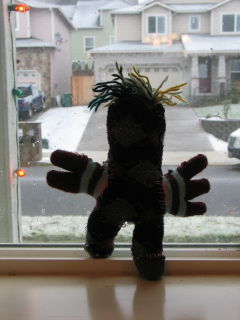
["IS THAT... SNOW?!"]

[toby catches snowflakes on his tongue]
back in from this delightfully unexpected snow, we settled in and got ourselves set up with snack plates:
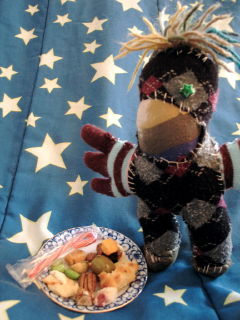
[a little bit of everything]
gregory joined us, too, though he says christmas isn't really a big deal for him.

["don't mind me. halloween's more my sort of holiday."]
when toby was finally able to open his stocking, he was delighted to find a chocolate, a tiny rubber ducky, and finger puppets for him!

["LOOK AT ALL MY NEW FRIENDS!"]
but of course, that was just the prelude. he really wanted to know what was inside the present he had been carrying around for days.

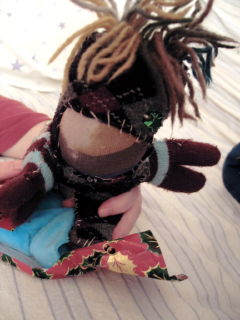
[antici...]

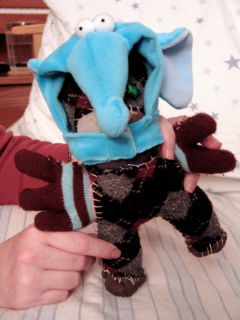
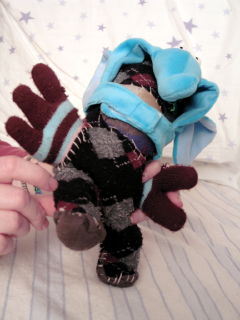
[...pation!]
sven and i were completely surprised, but toby wasn't: he was predicting an elephant all week! we told him an elephant was probably too big to fit in a package that small, but it turns out toby was right all along. he could hardly wait to show gregory:

["AREN'T I CUTE?"]
it took a while for him to settle down, which gave us plenty of time to open our own presents. finally, we toasted the conclusion of our abundant and joyful "kissmas":
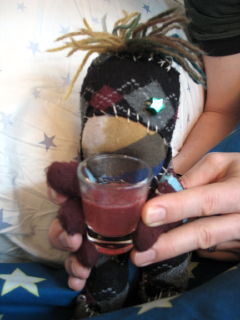
["GOD BLESS US, EVERY ONE!"]
posted by gl. | permalink | categories: toby
December 28, 2007
stopmo aesthetics
by sven at 12:35 am
On 12.22.07 Neil Gaiman released a sneak peek at the upcoming Coraline film that Henry Selick and Laika are producing. The clip is astonishing. For a particular style of stopmo, it's establishing a new standard for perfection.
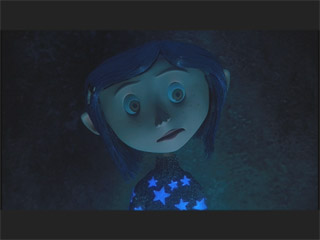
However, the animation is so good it's rather disconcerting. At first, a lot of people aren't sure if they're looking at stopmo or CG. Both among friends and at SMA, there's a discussion going on about the "hand-made look" versus the "CG look" and which one each of us prefers.
I'm troubled, because there are tangled undertones in these conversations: Resentment that Laika is setting a standard that no hobbyist will ever be able to match. A reactionary sense of superiority, that stopmo which bears the marks of human imperfection has more soul. A sense of betrayal, because Coraline's aesthetic is reminiscent of CG... Because among stopmoes, CG is the bad guy: it literally killed the use of stopmo for photo-realistic monster effects (e.g. Jurassic Park, King Kong) -- and seems to have a strangle-hold on mainstream cinema that keeps stopmo in general marginalized.
Me, I'm very interested in the visual style that's being established for Coraline. I'm excited to discuss it with other people... But I want a more expansive conversation than "hand-made" vs. "CG." The way that I see it, the spectrum of stopmo aesthetics is much broader than that.
So this is how I'm choosing to respond to the discussion -- with an essay that considers eight or more distinct stopmo aesthetics.
I. MOTHER ART FORMS
While there may be earlier precursors, stopmo is an art form that was essentially developed during the 20th century. It's new. So naturally, visual styles have been borrowed from other art forms. That's my thesis: stopmo has borrowed its various "looks" from other arts.
I feel this is a pretty easy idea to demonstrate... Off the top of my head I can think of quite a few films whose influences are blatant. But, of course, there are going to be plenty of films that are more difficult to categorize. Artists, being who we are, like to mix and match.
Also, besides "mix and match," I think that stopmo styles evolve through a sort of "imitative drift." Certain artists establish a style which is much imitated -- but with each iteration, the concept becomes mutated (sometimes for better, sometimes for worse). The Rankin & Bass look is a good example. It established a recognizable style... Which people are still copying today -- sometimes embellishing upon it, sometimes just making shoddy rip-offs.
OK, so let's consider the spectrum of aesthetics. Here are the the mother art forms that I've been able to identify:
- Puppetry
- Cartoons
- Miniatures / Models / Dolls
- Assemblage / Found Objects
- Photo Realism
- Living Toys
- CG / Vinyl
- 2D Illustration
1. Puppetry
Eastern Europe, particularly Czechoslovakia, has a strong tradition of puppetry. Stopmo films coming from the Czechs (particularly older films) have the flavor of marionette shows without the strings. The puppet heads are made from carved wood, the story-telling feels like it's based on the traditions of live performances of puppetry, rather than cinematic conventions...
Example: Jiri Trnka
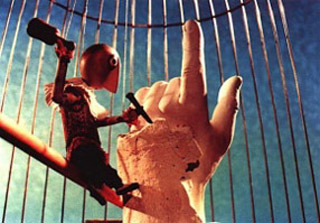
2. Cartoons
Some stopmo films attempt to be a traditional cartoon film -- but in 3D. What is the "cartoon look"? Probably the most distinguishing "cartoony" quality is that the film's world seems to be made entirely out of squishy-springy rubber. This look usually has an emphasis on squash-and-stretch. Sometimes you can see puppet designs even imitating the "ball and rubber-hose" construction of early black and white cartoons (e.g. Steamboat Willie).
Example: Will Vinton's "Noid" (for Dominos Pizza)
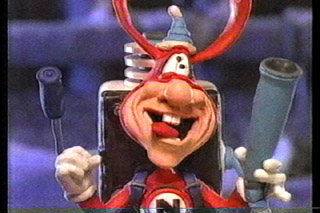
3. Miniatures / Models / Dolls
There's a tradition of trying to make exact replicas of real world objects -- only in miniature. Think of dioramas that you see in museums, model ships, and fancy doll houses. Some stopmo tries to accomplish just this. There might be slight stylizations -- but these are incidental. The artist has tried to copy the look of the real world in miniature to the best of their ability.
Example: Nick Hilligoss' "Good Riddance" series
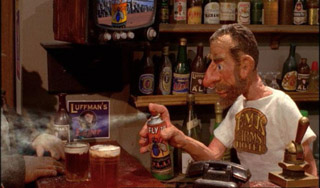
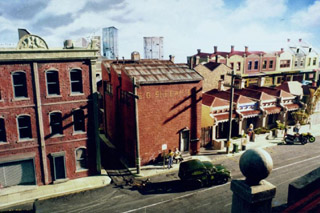
4. Assemblage / Found Objects
There is a sculptural tradition of making "assemblages" out of found objects. Some stopmo films derive from this aesthetic. The worlds we peek into look as if they are built of dust, old wood, broken bits of machinery... If there are "puppets" at all, they aren't intended to fool us into believing they're creatures with souls. Even when human-shaped puppets are moving, the footage looks like "object animation." The puppet animation seems to be an extension of the original impulse to make recognizably inanimate objects move, rather than an attempt to make miniature actors give a performance.
Examples: Svankmajer, The Brothers Quay
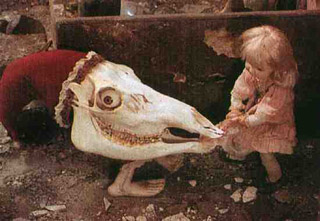
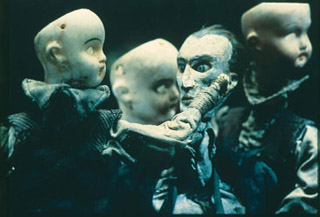
5. Photo-Realism
Photo-realistic stopmo descends from trick photography, like the old supposed photographs of fairies. The point is to make stopmo footage which will blend seamlessly with live actors. Unlike most stopmo, which gives us whole worlds, stopmo done with this aesthetic is usually interjected into live-action sequences. Its greatest success is when we can't tell where the live action ends and the stopmo begins.
Examples: Willis O'Brien, Ray Harryhausen, Phil Tippet
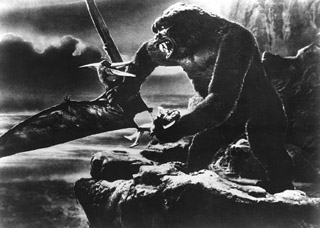
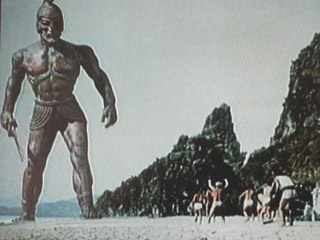

6. Living Toys
Who hasn't wished that their toys could come to life? Stopmo gives us the ability to make that happen. The puppets are appealing because they look like things that we own. (Which is different than film productions where toy tie-ins are made after the fact.) Maybe they're "girl toys" (stuffed animals, perhaps); maybe they're "boy toys" (e.g. collectible action figures). Both come from the same impulse.
Examples: Domokun, Robot Chicken
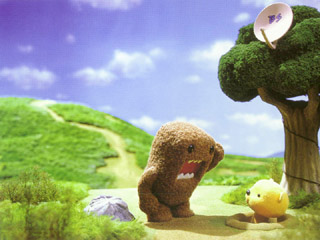
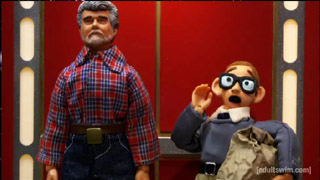
7. CG / Vinyl
Computer Generated animation has a recognizable look to it, which is the result of the tools used in its creation. Both the motions of the characters and the textures of their world are noticeably smooth. The CG look has a strong relationship with the use of vector graphics in the world of design and with the urban vinyl / designer toys movement (which sometimes uses 3D printers). In all three cases, these are images and objects that have been created using mathematical forms.
It's a fairly new phenomenon, but some stopmo seems to be trying to imitate the look of CG.
Examples: The Corpse Bride, Otafuku Rex
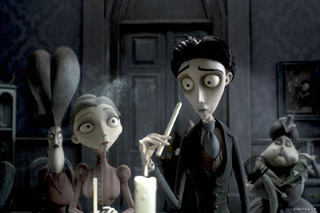
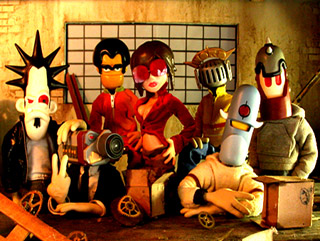
8. 2D Illustration
The world of illustration has countless visual styles (or at least, more than I've been able to wrap my mind around). Illustrations for comic books, children's books, magazines... Some stopmo attempts to capture the style of a 2D illustrator and translate it into a 3D living world. Rankin & Bass' "Mad Monster Party," for example, was an attempt to translate the works of artists who produced Mad Magazine. Or, consider "The Nightmare Before Christmas": it's based on a storybook written by Tim Burton... No animator would ever have initiated a character design as problematic as Jack Skellington's!
Examples: Rankin & Bass' Mad Monster Party, The Nightmare Before Christmas
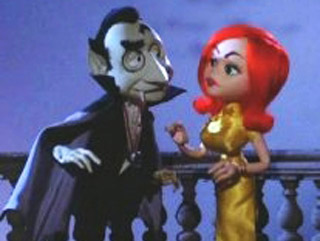
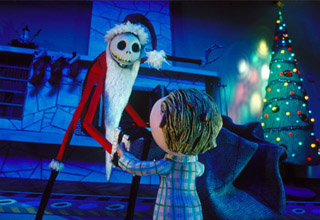
II. MATERIALITY
It seems to me that the various stopmo aesthetics are clearly descended from other art forms: puppetry, cartoons, model-building, assemblage, photography, children's toys, computer animation, and 2D illustration. However, I would be remiss if I didn't also discuss the ways in which the materiality of stopmo also plays into its aesthetics.
Wood
Puppets with wooden heads are generally somewhat inscrutable. If they seem to have an internal emotional life, then this has to be conveyed with pantomime. Because wood puppets make for...wooden actors...there is an inherent distance between the "actors" and the audience. Rather than focussing on the puppets' internal worlds, the artist is compelled to tell broader stories where the characters are more archetypal -- fables and myths being apt material.
Clay
Squash and stretch is difficult to do with most puppet-making materials -- but it's very well suited to clay animation. Hence, there is a natural affinity between clay and the cartoon style. Similarly, cel-animation tends to use flat colors -- which again, is easily reproduced with clay.
Foam Latex
Foam latex is based on an organic material: latex sap is harvested from trees... Both liquid latex and foam latex do a good job of simulating flesh... Hence, they're well suited for the needs of Photo-Realistic animation, where the puppets are supposed to impersonate animals.
Resin
Casting resins are, in some ways, an evolutionary leap up from using wood for puppets. By doing detailed sculpts in clay, taking molds, and then making castings, much more complex shapes can be created. This process is well-suited to the needs of an artist who is trying to translate 2D illustrations into 3D puppets.
Silicone
Silicone, vinyl, and CG lend themselves to the needs of industrial production and mass-marketing. With these materials, you can design a character using vector mathematics, which can then be reproduced with absolute accuracy for either either film media, print media, or consumer-oriented toys. When you're mass-producing dreams, uniformity is is the goal...
III. PUPPET PHILOSOPHY: FROM THE LIVING DEAD TO THE ILLUSION OF LIFE
Visual aesthetics aren't merely surface styles -- they're also motivated by philosophies about what it is that we're trying to do with stopmo as an Art. (Yes, that's Art with a capital "A".)
Here are some questions to ponder: What is the purpose of the puppet? How emotionally close to or distant from the puppets should the audience feel? To what extent are animators breathing a soul into their characters -- versus eerily pushing around objects which were never alive and never will be?
It seems to me that there are a limited number of possible philosophies underlying the aesthetics of stopmo. Really I only see four.
1. Puppets Are The Living Dead
The Brothers Quay don't try to invest soul into their puppets. The dolls and assemblages of found objects which they move about in their films remain essentially inanimate. If they have a life, it is a life which we cannot understand -- if they have dreams, they are the dreams of scissors and broken dolls.
Animatronic dummies often are close to looking like humans -- and yet, narrowly fail in their impersonation in a way that creeps us out. This phenomenon is sometimes referred to as the "uncanny valley," a place which lies between laughable failure and success. At times, this is precisely where the Quays want to put the audience... The epitome of this thought is to animate meat: the object is not simply being animated -- it's being eerily reanimated.
2. Puppets Are Stand-Ins For Archetypes
With the wooden-headed czech puppets, there's no way to mistake the puppets for actual living things... And yet, we are intended to use our imaginations to project thoughts and feelings into the puppets. This is exactly the same experience that we have when watching a traditional puppet show. Having stopmo puppets move without strings merely removes some of the technicalities of puppetry (e.g. strings) which might otherwise distract us from the story's telling. Yet, even so, the burden of putting life into the puppets falls on the audience.
3. Puppets Are Trick Photography
When we watch photo-realistic foam latex monsters interacting with live action actors, the audience is meant to believe that the puppets are real living things. The audience shouldn't have to do any work investing life into the Kraken in Clash of the Titans -- Uncle Ray has managed to accomplish that illusion for us.
But what is Harryhausen's own relationship with the puppet? He's often talked about how the animator is like a magician, who shouldn't reveal how he accomplishes his tricks. The puppet is a prop, a special effect. Even when Ray makes one of his creatures give a convincing performance, at the end of the day his puppets are only meant to be a foil for the film's live-action protagonists.
4. Puppets Are Miniature Costumes
Henry Selick is known for treating his animators like actors, whose job is to deliver a performance. When you watch documentaries about the making of "Curse of the Were-Rabbit," you can see Nick Park acting out the mannerisms of different characters with his animators. The puppet is essentially a tiny costume which the animator puts on.
In this approach to stopmo, the whole point is for the artist to put themselves inside of the puppet's body. You're supposed to be able to physically feel in your own body the way that the puppet moves. It's an existentially unnerving experience: trading hours of time in your life to create seconds in the life of the puppet. You are very literally sacrificing some of your life, putting it into this inanimate object, in order to temporarily give it a soul.
IV. AN OBLIGATORY CLOSING STATEMENT
After this encyclopedic survey, I feel obliged to confess my own preferences.
Puppetry, cartoons, miniatures, assemblage, photo-realism, living toys, CG, 2D illustration... When I consider the stopmo films derived from each of these "mother art forms," I can usually find examples that are truly great. If there is no truly great film in a category yet, then I hold onto the hope that it simply hasn't been made yet. Thus I refuse to weigh in on the polarized "hand-made" versus "CG" debate.
As a multi-media artist-animator, I think my favorite visual aesthetic is Illustration. To me, beginning with drawings, and then creating a stylized, immersive fantasy world is the ultimate in creativity. That's what I want to do.
Consequently, I'm drawn to resin and foam latex as my primary fabrication materials. I want puppets that have been cast, because it gives me excellent control of visual details. Where possible, I'll use hard parts (resin), because it maintains its carefully sculpted form even better than a soft material. I am strongly attracted to the longevity of silicone for flexible areas of the puppet -- but the difficulties of giving its surface a painterly look are a significant hurdle.
In terms of puppet philosophy, I'm most drawn to dealing with puppets as if they are costumes and I am the actor. This shouldn't be too surprising -- in general most people are attracted to narrative stories with strong protagonists and linear, comprehensible plots. I do have an irrational fondness for monsters... But for me, wanting to connect with the emotions and inner worlds of characters is even more important.
In conclusion: My hope is that having read this far, fellow animators will get some sparks of inspiration that help them to better triangulate their own aspirations for art-making... And in the process also find greater tolerance/empathy for folks who are pursuing aesthetics different from their own.
posted by sven | permalink | categories: stopmo
December 27, 2007
monster month book for sale!
by sven at 12:47 am
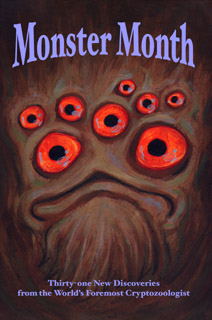
Monster Month 2007 is now available in book form, for sale at lulu.com!
I'm really proud of how it turned out. It really looks and feels like... a book. Gretchin and I put in some crazy hours during December, secretly slaving away so that we could get copies to people in time for xmas. Now that the recipients have unwrapped their surprises, we're making the book available to anyone who wants it!
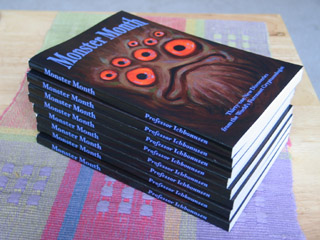
For the book version of Monster Month, I wrote up a new foreword, assembled 7 gorgeous new maps, and did a new painting for the cover. The book's a bit pricier than I'd like -- but ya gotta understand: everything's in full color!
Here's the promotional text for Scarlet Star Studio's first publication:
Monster Month
by Professor Ichbonnsen
Thirty-one days, thirty-one monsters: Monster Month!
After a lifetime of trekking jungles, climbing mountains, and spelunking caves, the world's foremost cryptozoologist at last reveals a selection of his greatest discoveries. Herein you will find the Adameve, the Dark Strider, the Opium Gore Golem, the Trick Squilligoss, the Zompire Bat... And many more fantastic beasts!
With the keen mind of a scientist and the bold heart of an explorer, Professor Ichbonnsen provides illuminating descriptions of how the creatures live -- and astonishing tales of how he found them.
Both adults and children will marvel at the Professor's adventures... And be left wondering what else remains yet undiscovered in the unexplored corners of our rich planet. Like the map-makers of old, you will understand: "Here be dragons!"
Monster Month is lavishly illustrated with 32 full-color paintings by Sven Bonnichsen, and 7 full-color maps tracing Professor Ichbonnsen's travels.
Again, where can you get it? At lulu.com. Here's the direct link: http://www.lulu.com/content/1744791
Thank you to Gretchin for the fantastic help laying out the book... And thank you to all the readers and supporters of Monster Month!
posted by sven | permalink | categories: bestiary, painting, writing
December 23, 2007
stopmo set-building: hills
by sven at 3:30 am
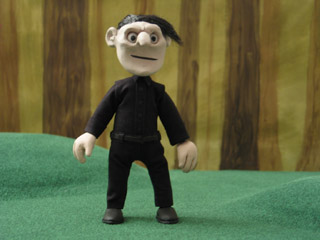
I've done very little set-building. So I'm trying some things out. Tonight's experiment: rather than have Ichbonnsen standing on a perfectly flat stage, I thought I'd throw in some little hills.
What kind of look am I going for? Something with clean lines and colors that you'd see on children's TV... Sorta like Domokun or Colargol (AKA Jeremy the Bear).
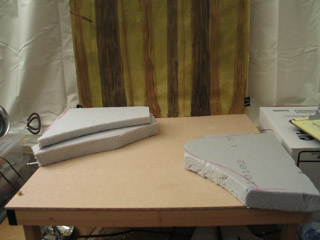
The stage is 1/4" thick MDF (Medium Density Fiberboard) from Home Depot. On top of this, I hot-glued a few pieces of insulation foam. This is a concept I picked up from a book on building terrain for miniature war games.
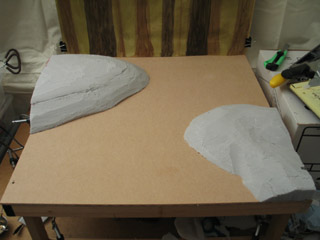
I carved the foam into shape using a carving knife, a craft knife, and a flexible blade that's sold for use with polymer clays.
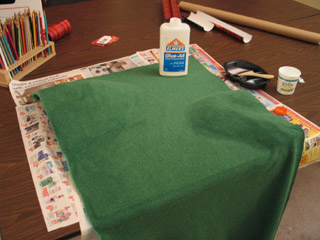
I picked up some luscious green fleece last month (?) thinking it would make awesome grass for a set at some point. I painted the foam and MDF with a layer of Elmer's glue, and then simply draped the cloth over the whole thing. I cut away the excess, leaving a little extra for safety.
Next: I'm thinking about some trees...
posted by sven | permalink | categories: stopmo
December 22, 2007
scary solstice from scarlet star studios!
by gl. at 2:06 pm

a scary solstice to all, and to all a good night!
posted by gl. | permalink | categories: miscellany
December 20, 2007
fish!
by sven at 1:37 am
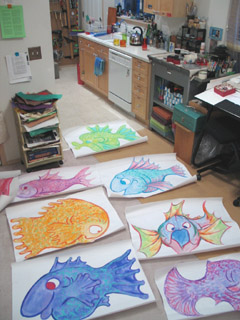
Two Sundays back (12/9) it was my friend Lane's birthday. I'm point-person for organizing her party each year. So I ask: Cake? Angel food with strawberries. Movie? Ice Age 2. Decorations?
...FISH!!
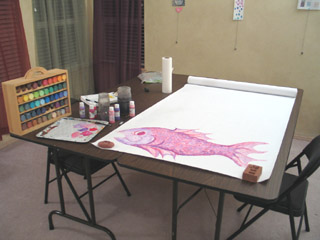
Fourteen years ago, during a difficult summer, I decorated Lane's house with lots of ginormous painted fish. It helped.
Play it again, Sven!
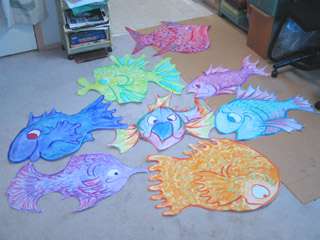
So, in the midst of an all-nighter, wherein I was hard at work on a super-secret xmas project, I managed to squeeze some time in during the wee hours just before dawn -- painting fish.
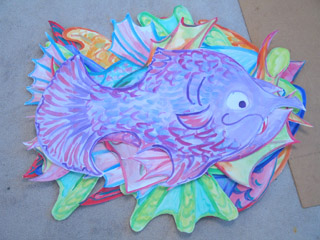
The original fish were watercolors. The new ones were done in acrylics. I cut 'em out, stacked 'em up, and drove 'em across town... Our friend (more like family, really) Jacque distracted Lane while I redecorated the house into a walk-in aquarium.
Lane was delighted! ...What a fun little project. :-)
posted by sven | permalink | categories: painting
December 19, 2007
toby's first present
by gl. at 4:19 pm
yesterday we got a surprise package from aiyana, shield's fiancée -- and it was addressed to toby!

[*gasp* "FOR ME?!"]
this is the first package he's ever received and he almost hyperventilated with joy. but we didn't know if he could open it: what if the package was also the wrapping? fortunately, toby had a plan:

["I'LL JUST CAMP OUT UNDER HERE UNTIL CHRISTMAS! WHEN'S CHRISTMAS?"]
so we wrote shield to ask if whatever was inside was wrapped, so at least toby could open the outside. "mr. spook & co" graciously responded, indicating that the outer packaging was merely a formality that could be dispensed with posthaste. so toby gleefully tore it open...

["THIS IS SO EXCITING!"]
...and found his very own toby-sized present inside!

["I'LL NEVER LET IT GO!"]
i think toby was so excited he slept with the present under the tree last night. we told him he just has 6 more days before he can open it: we'll start the countdown tomorrow, one for each arm.
also, at the rebel rabbit craft fair this weekend we met marty, a silly sock creature who has a traveling website, too! toby didn't get to meet him, but he'll be able to read about travels with marty -- as soon as he comes out from under the christmas tree. :)
posted by gl. | permalink | categories: links, toby
December 14, 2007
the strong silent type
by gl. at 11:56 pm
the last workshop of the year at scarlet star studios was the strong silent type: creating your own wordwear, which i cofacilitated w/ bridget benton. this was the first time i have tried to explain to people what i do and how i do it!
even better: i only know one way to make wordwear (string it on a sillk cord), but bridget brought her vast jewelry-making skills to share, allowing each piece to be as unique and meaningful as the words that were chosen. also, we have two different styles of creating: i'm small & precise, while bridget is free and loose. that allowed us to show different methods of letterstamping using different tools. most people tried both ways and found the style that worked best for them. yay!
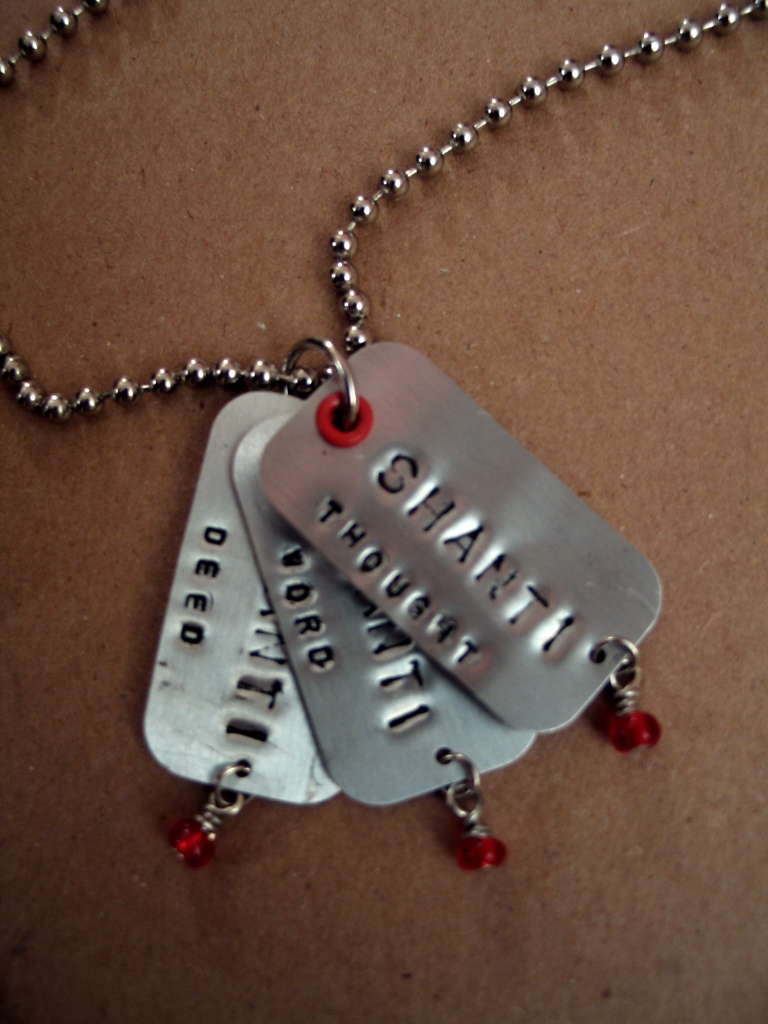
[aurora's "shanti" necklace: click to see some other creations]
i really enjoyed this workshop in part because i wanted to encourage people to use words that were their own, rather than quotes from another source. so i facilitated a series of 10-minute, stream-of-consciousness writing prompts to generate and highlight words that were meaningful for them:
- write about all the advice you've ever gotten
- what did you do this year that surprised or delighted you?
- what do you wish for when you see the first star?
i participated in the writings but was too busy afterwards to make any jewelry. i was not terribly surprised to find myself writing about astronomy again and using it as an analogy for people.
i was asked more than once if i thought people might buy less wordwear because they could make it themselves. that would actually make me happy! the scenario that would make me sad is someone who thinks "i could make that so i won't buy it" -- but then never makes it.
still, if i make a wordwear of my own soon, it may be a set of instructions:
- dream
- explore
- create
posted by gl. | permalink | categories: classes & workshops
December 11, 2007
keeping myself out of trouble
by gl. at 11:46 pm
another busy week last week:
artist's way ended, and there's always a flurry of activity, primarily online, around ending that.
working on a secret project with sven. more, much more, about that later, but it did absorb a lot of time i didn't know i had to spare.
first thursday
shu-ju is a superwoman, but even she couldn't be at three (!) places at the same time, so she asked if i would manage her table at the "portland prints" show at city hall. but of course! i was pretty comfortable (talking about someone else's work is easier than talking about your own), though i was surprised i didn't sell anything.first friday
- thirty!
one of my artist's way clients had thirty pieces in the thirty! show and it was a madhouse! i was flabbergasted at how many people they could pack in such a tiny space. i would have liked some more time & space to appreciate the art: with 900 pieces stacked from floor to ceiling, the format was overwhelming & way too competitive for me. but i was thrilled to get to support shawn and i was happy to leave with one of her pieces -- lucky for me, the one with a hidden poem on the back!

- 23 sandy: "night moves"
i love nighttime art & photography, so i had to go see this show at 23 sandy! some really beautiful work in the main gallery & the "side show" which feature's laura's book arts. one of the highlights was an image of the "aurora australis": the southern lights. - art of your life
stopped by for the holiday sale at the art of your life to see serena barton, diane havnen smith and serena's daughter jane. i bought a pair of earrings that remind me of serena's paintings: romantic pearl hoops in an unusual configuration.
- thirty!
wordwear workshop
there will be more on this later, too, but the strong silent type required some prep time for me & bridget before we taught the class, and then the class took longer than we expected! fun to share those techniques with others, though.masarie curry party
from the creators of the fabulous create the world event, the curry party is a holiday party that focuses around a base of chicken or veggie curry with shared bowls of every possible condiment & different curries. It's delicious, but really, it's just an excuse to have a party. the hosts have always been really supportive of me and i enjoy myself immensely whenever i attend one of their events. it's the kind of place you meet really interesting people each year: this year I spent much of the meal talking to a firefighter from bend.rebel rabbit craft fair
anna's back with the second incarnation of the [rebel rabbit craft fair]. i was on my way to a birthday party so i didn't get to spend as much time there as i would have liked, but i did pick up a tiny (red!) felted starfish as a present from addie pearl. and fortunately for me, the rebel rabbit is TWO weekends this time, so i'll go again this weekend.dinnergrrls dessert potluck
i rarely get to many of the dinnergrrls events, but i try to make a point to stop by for the holiday party in december and the anniversary party in summer (...and when they buy tix for the roller derby ;). i thought i'd only stay an hour but i stayed two, and though i didn't actually eat much, the sugar high was contagious. fortunately i managed to leave before the sugar crash, though i did zonk on the couch for a bit coming home. i had a lot of good conversations and very little awkwardness. such a relief! maybe i'm getting better at this? :)
posted by gl. | permalink | categories: exhibits & events
December 10, 2007
the business of stopmo: a primer and a manifesto
by sven at 11:59 pm
[Reprinted from a thread I started at StopMotionAnimation.com... This is an essay I wrote in response to the "How about it - can we make a little scratch in today's digital media environment?" thread, here.]
OK, let's get down to basics... Givens: (1) You're a person who loves filmmaking. (2) You want to make money while doing it. ...What we're talking about here is running a business.
1. PRODUCT & INVENTORY
So, let's think like we're running a business. First off, you need a product to sell. Your product is your film. But filmmaking isn't like painting, where you would ever sell the original... We're in the business of selling copies. I'm going to assume that means making DVDs.
If you were a world-renowned painter who could sell a single painting for $20,000, maybe you could earn a year's worth of living expenses with one sale. No one's going to buy a DVD for $20,000 though...
So, it looks like you're going to need to sell many DVDs in order to make this endeavor profitable. That means keeping inventory on hand. Suppose for the moment that you want a hundred copies available for sale. Right now I can see three options:
(1) buy a stack of blank DVDs, cases, and labels for about $100 total and deal with production and order-fulfillment yourself;
(2) have a professional service burn the discs and print the labels for you, at a cost of ~$7.50 each, therefore $750 total (different deals will vary);
(3) use a print-on-demand service like lulu.com, which allows you to produce each DVD when it is ordered -- and which will take care of fulfilling orders for you, too -- thus, an out-of-pocket cost of $0.
[Personally, I know which means of production I want to pursue. ;-) ]
Let me point out that most of the folks on SMA don't even get this far in terms of creating their stopmo business model... Which drives me nuts! Here we have a message board full of stopmo enthusiasts -- the people most likely in all the world to buy a stopmo film -- and we don't even make it possible to buy films from each other! I'd love to buy DVDs from Nick, Lio, Strider, Paul, Mysterious Ron, Jriggity, Toggo... I'll stop there -- but you get my drift.
Folks, I WANT to buy your films -- but I can't, because there's no physical product there to buy! PLEASE, pick a means for producing some inventory, even if it's just home-burned DVDs, and make them available to me!
2. BUDGET & INITIAL INVESTMENT
OK, so let's assume that you want to be in the business of creating DVDs to sell. You first got into this art because you love it, not in order to make money -- so to make the transition, you're going to have to change your perspective and start thinking about the budget.
Here's the challenge that every maker of art must face: in order to make a profit, you have to bring in more money than you spent on creating your product. Easy enough -- except for one horrifying glitch: stopmo is astronomically expensive to produce!
How expensive? Let's look at a hypothetical 5-minute film and talk about what your initial investment is.
Tools of the trade, a computer and camera, you probably owned anyway -- so I'm willing to ignore those. Sculpey, aluminum armature wire, plaster, wood... I'll bet you could make a fine looking 5-minute film for under $100 in material costs. Even if you move up to foam latex and silicone, the material costs probably won't kill you...
It's TIME that's the killer. How many hours does it take to make a stopmo film, when you consider both fabrication and animating? Let's say you work at 12fps, and can pose a frame every 2.5 minutes. That's 2 seconds of film produced per hour. A five minute film, then, takes 150 hours to shoot. Fabrication usually takes longer than shooting the film itself -- I usually estimate 3 times as long -- so, we'll say that this 5 minute film takes 600 hours total to make.
If you were paying yourself a bit better than minimum wage, say $10 per hour, that means this hypothetical 5 minute film is going to cost you $6100 to create. That's how much money you're going to have to make back, just to break even!
Oh, I could talk about cutting corners at this point -- using cheaper materials, stories with fewer characters, filming at a lower fps... But who am I kidding? If you don't love the film, you're not going to go through the hell of creating it. Just accept that, yes, stopmo is painfully expensive to create.
3. PRICING, PRICE POINT, & VOLUME
Pricing is not guess work. It's math. Deal with it. Embrace it. It's not that damned hard.
If you were making one-of-a-kind paintings, this is the formula you would use to price your products: cost of materials + cost of labor + mark-up to whatever the market is willing to pay.
The accepted price point (what people are willing to pay) for feature-length DVDs is $10-$25. People might be willing to pay less than that, but they're not going to pay more. Your film is only 5 minutes long, so you're going to be doing pretty well if you can get people to spend $10...
But, if you sell just one copy of your film for $10, you've just made negative $6090. ...Which is why you're in the business of selling DVD copies, not the original. (Duh.)
OK, let's set our sights on just breaking even. Let's say that you use an online print-on-demand service, where it costs $7.50 to produce a DVD -- but whatever you charge on top of that is money that goes to you. If you can sell your DVDs for $10 each, that means you're raking in $2.50 each...
Which means it's an easy calculation to figure out how much volume we need to move. To make back your initial investment of $6100, you're going to have to sell 2440 copies.
Ouch.
And to make a modest living of $20,000 per year? That's another 8000 copies that you're going to want to move.
Double-ouch.
4. SELLING OUT
I assume that the people I'm writing this for are artists. We have visions that we want to share on film. However, we also have craft skills that we can sell... Which, sadly, is a much more profitable route to go.
As far as I can see, there are four ways to try to make money while doing stopmo:
(1) make your own film and sell DVD copies;
(2) work as an animator/fabricator at a studio that does stopmo;
(3) start your own stopmo studio, which produces and sells TV commercials and music videos to companies with deep pockets (deep because they're moving huge volumes of their own products);
(4) create a film and sell it to a media company that makes its profits either by distributing a catalog of films, or which broadcasts content and makes its real money off ad revenue.
I've done a little bit of freelance work for a local stopmo studio... If I recall, I was making $15/hour before taxes. Freelance work, kinda by definition, isn't steady... But suppose I wanted to make $20,000 a year doing that. If we assume that taxes are going to take about a third of my pay before it even reaches me, then it's easy to figure out that I'm going to need to work for 2000 hours each year. ...Which translates into fifty weeks of 40 hours each.
Nice work if you can get it... But of course, that's not going to leave a lot of time in your life to make that hypothetical 5-minute film I mentioned earlier, which would take 600 hours to produce (fifteen 40-hour weeks).
Running your own stopmo studio, you can get big money coming in, which hypothetically you can channel into a side project -- possibly making a film even with the help of other animators... But the level of complexity grows too, in terms of getting people their paychecks, dealing with insurance, etc... Well, I don't know enough to go that route.
Plus, if your own studio could make a film, you'd still have to find a media company that will buy it for distribution. At that level, you're not going to risk making a film before finding a buyer -- you're going to court potential buyers with a pitch, and try to sell them on investing in you up front.
Are there media companies interested in buying short films from people who've already created a product? Probably. But I don't personally know anything about them. All I can do is ask: How much is any particular company -- who is primarily interested in their own profit -- likely to pay for 5 minutes worth of content? ...$50? $500? $2000?
Maybe broadcast media are different -- but if the company in question sells DVDs, then they'd be subject to the same math that we talked about earlier: To earn $20,000, they'd have to move 10,440 copies.
Granted, they can probably get volume discounts during production -- but that's still a truly phenomenal number of units to sell when your product only lasts 5 minutes. ...And did I mention that your royalties are going to be skimmed off the top? Probably something like 25 or 50 cents per unit?
OK, now that we've taken a fairly in-depth look at the options for making things to sell, I want to turn attention to consumers -- the people you're going to try to sell your products to.
5. MARKETS ARE EITHER GROWING OR SHRINKING
Let's start with the big picture.
Markets don't simply exist -- they grow or they shrink. ...And, in my opinion, we have it in our power to help make the size of the stopmo audience go in either direction.
I believe that at the heart of every consumer movement there is a core of die-hard enthusiasts. Be their passion for stamp-collecting or for Harley-Davidson motorcycles, wherever there's a shared passion, you've got the seed for a money tree. For stopmo, that essential core of enthusiasts is us -- the 6000-odd lurkers and contributors at SMA.
Look at science fiction. Back in the 30s it was viewed as badly-written kid stuff, not to be taken seriously. It was printed on pulp paper, the cheapest material available, because both the paper and the content was so disposable. Sci fi films have followed a similar path -- look back at attitudes in the 60s -- before 2001 and Star Wars -- when it was all B-movie stuff, not taken seriously by the general public. Where is sci fi now? It's a huge force in the book publishing industry, and it's raking in billions of dollars world-wide in the sale of films. Why? The enthusiasts were determined and won out.
More recently, look at how anime has taken root in the US. It wasn't very long ago that it was just a handful of enthusiasts who even knew what anime is... Now, go into Best Buy, and there are shelves of the stuff for sale.
Why can't the same thing happen with stopmo? In Eastern Europe, the puppet film tradition (I'm told) has a long heritage and continues to thrive. It's a different culture, with stronger ties to traditional puppetry... But even so, why couldn't it happen here too?
6. HOW TO SELL SHORT FILMS
Stopmo certainly can sell. Wallace and Gromit, the Nightmare Before Christmas, Robot Chicken... People are hungry for this stuff.
It seems to me that the real problem that we have in terms of marketing our own home-brewed stopmo films is length. In my opinion, a DVD is generally supposed to provide between 45-minutes and 2-hours worth of entertainment. If I buy a 5-minute stopmo film on DVD for $10, I definitely feel like I'm doing the author a bit of a favor. Mind you, it's a favor that I'm eager to do, because I love the art form.
I want to point out that stopmo is not the only art form that suffers from issues of scale. How about short stories? You can sell a short story in the form of a chapbook -- but generally you're going to have a challenging time selling to anyone besides other short-story enthusiasts.
Even more generally, I'd like to point out that MOST artists are starving artists. Poets, novelists, painters, sculptors, makers of short live-action films... We all have to struggle with the time-invested vs. income-generated equation.
Short stories, though, I think are a particularly good analogy for stopmoes to look at. How do you sell a short story? Put it in an anthology.
A DVD anthology of good looking films, in attractive packaging? That could sell.
Enough units to make back what you spent on making your film? Um, honestly probably not. But I'm willing to bet that a 30 minute DVD that contains six five-minute shorts can at least sell more volume than those six films could if they were packaged independently.
7. THE MARKET BEGINS WITH ME
Stopmoes... We love this art form with a crazy intensity. We'll eat up whatever gets produced. And yet we aren't even making our films into physical products and selling them to each other!
The way I see it, we need to stop imagining cinderella stories: starving artist gets swept away by producer prince and lives happily ever after in the castle of film distribution. Instead, we need to take power into our own hands. With home DVD-burners and online print-on-demand services, we now have the means of inexpensively producing the very products that we ourselves want to buy.
Imagine if you will a DVD compilation title "the best of StopMotionAnimation.com"... Pretty sweet, huh?
Then, if we as a community were to continue developing in this direction -- insisting that our projects become actual products, and pressing to make the best single-short DVDs and anthology DVDs we can -- well, then how can we fail to begin attracting a broader audience?
8. A MANIFESTO FOR STOPMO FILMMAKERS
Time to wrap this up. And here's where I step up onto my wooden crate marked "manifesto-brand soaps"...
We who love stop-motion animation and who want to see its influence in the world grow, we must:
(1) Take responsibility for turning our filmmaking projects into more than a just hobby, but rather a business. (Even if it loses money.)
(2) Produce DVD versions of our films, and at the very least make them available for sale to other stopmo enthusiasts.
(3) Gather our short films together into anthologies, which make film-viewers feel like they are getting full-value for their entertainment dollar.
(4) Begin expanding the market for stop-motion animation, first by making our products available to other stopmo enthusiasts, and then by drawing others into the passion.
(5) Keep making films. Because if we don't give the audience products to buy frequently enough, their shopping attention won't stay engaged, and they'll just wander away.
And in my best inspirational seminar voice:
We're all in this together folks, so let's "get down to business" -- and really get to work.
[End of speech. You'll find copies of my book in the lobby. I'll be available for signing after a brief intermission... :-P ]
posted by sven | permalink | categories: stopmo, writing
December 9, 2007
artist's way guided intent (december)
by gl. at 9:33 pm
on wednesday we hosted the last guided intent of the year! the theme was "abundance" and the activity was blind painting, which combines movement, paint and writing in a very satisfying way. this is my favorite theme and one of my favorite activities! plus, this is the night i get to introduce one of the most valuable tools i learned from my artist's way teacher in san diego: three safe ways to give non-critical feedback. they are experiential rather than judgmental in nature. i described these responses when writing about this event last year.
this event went really well. i wanted to add a body awareness segment this time to get people moving sooner, and that really did help, but in general the whole thing had a great blend of structure and flow. for the feedback i was able to respond first to a piece i thought would make a good example, then ask for someone to respond to another piece, so all the pieces got at least two forms of feedback.
in general i'm keen on finding the right form of feedback for events. i believe that some forms of positive feedback only reward "pretty" art or encourage the idea that if it's not beautiful it's less valuable, which end up creating huge shadows of competition and conformity. bridget & i are still talking about ways to encourage feedback without killing creativity, feedback which explores meaning or encourages risktaking.
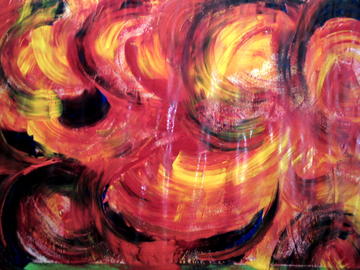
[joyce: bridge back to self (click to see the other paintings)]
the next guided intent will be the day after new year's: after the champagne and midnight celebrations, we'll bring "auld acquaintance" to mind by finding new ways to connect fact & fiction. we'll be writing about the imaginary lives of people from old photographs, so we'll begin the new year gently by creating kinship, commonality & contact with these characters -- and other writers!
posted by gl. | permalink | categories: artist's way
December 7, 2007
artist's way: session 11
by gl. at 12:38 pm
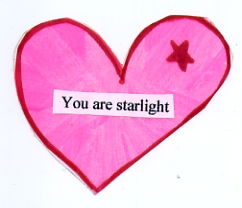
our final week is always a surprise when it arrives, even though i often warn us about its coming a month in advance because the participants are assigned a "response project" to present at the last session.
response projects are like final projects but they aren't worth 50% of your grade. (as i kept reminding them, "you can't fail artist's way!") it gives creative cluster members an opportunity to explore one of the arts we've done during our time together or to strike out on their own. because while i very much enjoy creating the opportunity for them to create art at the studio, the point of going through artist's way is to learn to create art outside the studio on your own. :) anyway, some really phenomenal pieces, including a series of images connected to the basic principles, a powerful music cd, a set of art dolls representing everyone in the cluster, a slideshow presentation, a guerilla art project with hearts in library books, a copperplate etching, a small dancing performance, and an artist's book.
after each presentation i gave everyone an specially chosen inspirational magnet and a dried scarlet runner bean from our garden. but there was a lot of gifting going on: laminated hearts, art dolls, books, and even a tiny tea set!
i am pleased to announce that given my experience with this cluster, the 10-week format works! so i'm going to try it again, timing the next artist's way creative cluster with the spring quarterly calendar in april 2008.

center (faith): soup! the studio has a kitchen; why not use it? :) since i believe creativity is not just limited to Art, on the last session we make a stone soup where each member contributes something. i provide a veggie broth base, and this year we had a stew chock full of carrots, onions, parsnips, yams & brussel sprouts. the rosemary is for remembrance. i usually add special star pastini 10 minutes before serving, but one of the particiants brought noodles, so we had starless soup. but the fried onions i got on the outing last week were a big hit!
music: k.d. lang's ingenue
posted by gl. | permalink | categories: artist's way
December 3, 2007
bibliofile
by gl. at 3:44 pm
it took me a while to get to this, but if you're looking for a remarkable bibliophile present, might i recommend peacay's first book: BibliOdyssey: Amazing Archival Images from the Internet? bibliodyssey features objects of curiosity & wonder that have been hiding in library collections for dozens or hundreds of years. ever since i stumbled across the bibliodyssey website i've been captivated at its discoveries and delighted by its range & depth. it's the same joy i experience when i'm able to access old book & manuscript collections, but without having to move too close to the getty or the british library. ;)
posted by gl. | permalink | categories: links, miscellany
December 2, 2007
'tis the season
by gl. at 11:12 pm
busy week!
can i tell you something?
last week i attended the showing of can i tell you something, a short "audio collage" about keeping & telling secrets (my voice opened & closed the film). other secrets were hung on clotheslines like dirty laundry around the room. i really appreciated the people who came to support me, like anna, sven, michaelmas, todd & kristen. todd noticed it was trying to spit snow that night, which made yesterday's snow slightly less shocking, but no less delightful.bridget's holiday craft party
last night i attended bridget's annual holiday craft party, where i made half a dozen tiny snowmen and sven made an awesome, um... chair/robot creature... with arms that were attached to the puppet with magnets! it was our first time working in bridget's studio & it was quite nice -- though it was so fascinating that it was difficult to get down to work! we expected to stay two hours and instead we stayed four. :)
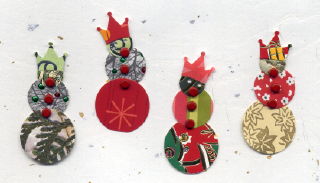
[tiny snowmen w/ tinier crowns]
shawn demarest: thirty!
shawn is one of my artist's way clients and she just finished 30 small paintings for the thirty! show on friday at om: 30 artists, 30 pieces each, $30 each. but "before they scatter to the winds," she wanted to invite the other artist's way participants to her studio to see all of them. what a treat! we get over 200 people in the studio each year and i do so like getting a chance to see where some of them live & work. and i lovelovelove supporting artist's way clients!dinnergrrls holiday bazaar
today i also went to the dinnergrrls holiday bazaar where i got to see kristen, bridget (hello, again!) & vicki lind. i bought a collage from bridget (and eventually a pillow), two containers of chutney from mona's mom, and lisa tried to convince me to buy some sex toys. eeep! chrissy has some gorgeous photos, including a great story about opposing sunsets on her trip to las vegas. this event was also a good reason to introduce sven to cubespace, which i think is a fantastic idea and i'd probably use if i was doing more freelance work. :) he went to college with the woman who started it.jill kelly's holiday open house
then we stopped briefly to explore the local cash & carry, where we barely escaped the giant room-sized walk-in freezers -- but walked out with a huge bag of fried onions. armed with such savoury fare, we ended the day at jill's holiday open house, where we were greeted with a warm smile & a large cup of mulled cider. that place was jumping! we were talking the whole time, though we did slip in a bit of time in the office to go through jill's big book of collages.
posted by gl. | permalink | categories: exhibits & events